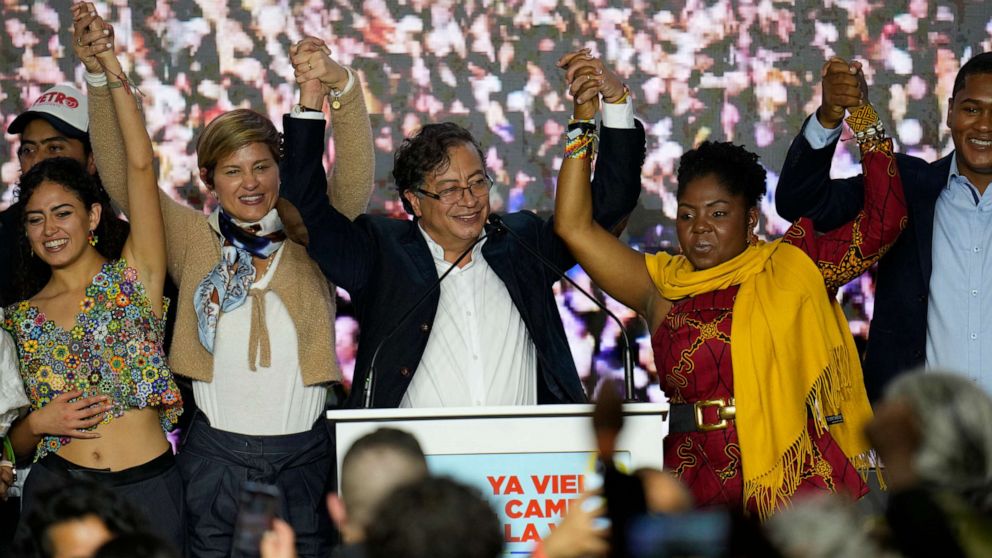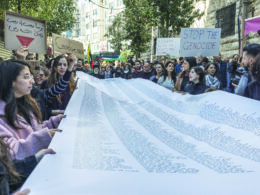By ISA in Colombia
After a tense and uncertain second round Gustavo Petro has won the Colombian presidential elections with 50.4% of the vote, beating right-populist opponent Rodolfo Hernandez who picked up 47.3%, a difference of 700,000 votes. Voter turnout was 58%, up from 54% in the first round and the highest in a Colombian election since 1998.
The mood amongst supporters of Pacto Historico (Historic Pact, the left wing alliance led by Petro) is jubilant and millions are celebrating this truly historic result. In a bastion of US imperialism; where the left has historically faced brutal violence at the hands of the state and right-wing paramilitaries — this year alone 52 activists have been murdered — over 11 million people voted for former M-19 guerrilla, Gustavo Petro.
Petro will be the first left president in the 213 year history of the Colombian state. Joining him is running mate Francia Marquez who will become Colombia’s first ever black vice-president. Workers, young people and the oppressed masses will draw confidence from Petro’s victory in the hope that a new period is opening up, one that leaves behind the successive regimes of violence and social misery that have dominated Colombia for decades.
Ultimately, the triumph of Petro and Pacto Historico must be seen as a product of the mass struggles that have rocked Colombia over the last period; the student demonstrations of 2018, the Paro Nacional of 2019 and, above all, last year’s social explosion triggered by the ‘paro nacional’ (general strike) that saw millions take to the streets in every corner of the country. Strikes and blockades paralysed the economy and radical youth organízed in la primera línea heroically faced down brutal state repression, leading a movement that shook Colombian capitalism to its foundations.
Petro and Marquez’ campaign saw hundreds of thousands attend rallies across the country, galvanized by their program for change: tackling staggering inequality and poverty, adopting a system of universal public healthcare, implementing the peace accords with the FARC and halting the extraction of fossil fuels.
We too share the enthusiasm and desire for social transformation that has been expressed in this extraordinary result. Nevertheless, as we have warned previously, Petro’s limited reformist program and his drift towards accommodating himself to the establishment will not be enough to meet the needs and demands of the Colombian masses. As a decaying world capitalism becomes further engulfed in a plethora of crises, Petro will be confronted with economic and political turmoil and a ruling class desperate to maintain control of the situation.
How Petro won
Unfortunately, some are claiming Petro owes his victory to his increasingly moderate approach and his ability to calm the fears of those concerned by his radical credentials. But is there any truth in this?
For much of the last year Petro’s victory seemed all but certain. That changed after the first round when the unexpected rise of Rodolfo Hernández complicated things. As the results came in May many Pacto Historico activists and supporters were seized by a sense of danger and even demoralization at the prospect of the reactionary, sexist Hernández becoming president.
As we pointed out in our analysis of the first round, the traditional political elite was dealt a significant blow with continuity candidate Federico ‘Fico’ Gutierrez failing to make it to the second round. Hernandez, a 77 year old multi-millionaire, went out of his way to distance himself from a completely discredited Uribismo, posing as being neither left nor right, but rather anti-system and anti-corruption. Nevertheless the ruling class were quick to line up behind him as the figure best suited to serve the rule of capital. Serving as a ‘kiss of death’, these endorsements helped expose Hernandez amongst a section of workers and youth who voted for him in the first round, believing he was a genuine anti–establishment candidate.
We must emphasize it was the heroic efforts of many rank and file activists who recognized the threat posed by Hernandez and went all out to convince friends, family, co-workers and neighbors to vote for Petro and Marquez. In reality, it was this strategy of turning out the vote that drove Petro to victory. Notable was the increased turnout in Bogota, the Caribbean coast, the Amazon and the Pacific. Those regions with a large Afro-Colombian and indigenous population, plagued by grinding poverty, super-exploitation and violent dispossession, voted for Pacto Historico.
Challenges, compromise and conciliation
While these results represent a real setback for the right, who are in utter disarray, we should be under no illusion that the forces of reaction will simply disappear. In fact some sectors have made it clear that they will fiercely oppose Petro’s project. Representing the most truculent wing of the Colombian ruling class and a potential candidate to lead the opposition, Maria Cabal of El Centro Democratico (party of Alvaro Uribe and outgoing president Ivan Duque) tweeted:
“A difficult stage of national life is about to begin and we must prepare ourselves to face it with the tenacity required to defend our principles and values. This is no time for conformism, it is time to fight for our freedom.”
Likewise, we should not underestimate the potential for paramilitary violence by groups that are tied by a thousand threads to the Colombian ruling class. On the election day itself two Pacto Historico activists were murdered in Cauca, a macabre warning to others.
Other sections of the bourgeoisie are attempting to domesticate Petro and are already congratulating him on his willingness to seek compromise and respect the integrity of the law and institutions. US imperialism took a similar approach. In the context of a waning influence in the region, president Joe Biden phoned Petro to congratulate him on his victory in an effort to maintain links with its most important ally in Latin America.
Although Pacto Historico are the largest force in Congress they fall significantly short of a majority. At the time of writing they are forming a coalition with Comunes (the political project of de-commissioned FARC combatants), the centrist Centro Esperanza, and most significantly one of the traditional parties of Colombian capitalism, El Partido Liberal. In order to calm the fears of big business and foregin investors Petro will name a moderate finance minister, looking towards Alejandro Gaviria — a former presidential candidate whose policies Petro criticised for being “unable to overcome neoliberalism.”
All of these moves towards the right and, above all, the alliance with the Liberal Party are being justified as a means for Petro to form a stable government that can see through legislation. However, this will come at a price and, as a recent Bloomberg article stated, “[Petro] may be forced to tone down some of his more radical proposals to keep his allies on board.” This is a mistaken approach that will only serve to demoralize and demobilize those activists and supporters who rallied around Pacto Historico in the hope of breaking with the status quo.
Although Petro and others justify their conciliation with establishment figures as seeking ‘governability’, that is extremely unlikely in the current period of capitalist crisis. 40% of the Colombian population live in poverty and 11% inflation will impact many more. As the US Fed raises interest rates Colombia’s peso risks further devaluation, creating problems for Colombia to service its foreign debt, which stands at over 50% of its GDP. If Petro chooses to simply manage capitalism he will oversee greater misery inflicted on the Colombian masses, and create the space for the far-right to grow further (with the emergence of figures far nastier than Hernández)
Build mass struggle
That’s why these elections must not be seen as an end in themselves but rather mark the beginning of a new period of class struggle and social change. Reflecting the more radical rank and file of Pacto Historico, environmental activist Francia Marquez declared in her victory speech:
“Let’s fight for dignity, let’s fight for social justice. Let’s go for women to eradicate patriarchy from our country. Let’s fight for the rights of the LGBTIQ community, let’s fight for the rights of our mother earth. Let’s eradicate structural racism.”
Of course, we fully agree and as members of ISA we are active in these struggles in Latin America and internationally. But the question remains: what program and strategy are required to carry out these fights?
For us it is only through the continued mobilization of the working class and oppressed masses in the streets, in our workplaces, in our neighborhoods, in the countryside, and in schools and universities that we can guarantee that the limited reforms proposed by Petro and Marquez will be carried through. But to defeat the right, to win a lasting peace and to point a way out of the economic and social crisis will require going further and mounting a challenge against capitalism and imperialism.
Colombian capitalism: Develop or overthrow?
Yet in Petro’s victory speech he once again made it clear that this was not his intention:
We are going to develop capitalism in Colombia, not because we worship it, but because we have, first of all, to overcome pre-modernity in Colombia, feudalism and the new forms of slavery.
We should be clear that the underdeveloped nature of capitalism in Colombia is structural. That is, its weakness does not come from poor policy decisions of this or that government but its economic subordination to especially US imperialism which, through the loyal assistance of the Colombian ruling class, has plundered the country of its abundant resources, exploited its cheap labour and gained access to its markets.
Petro’s project falsely assumes there exists a progressive section of the capitalist class with whom workers can align themselves in a common project of economic development. In reality this means the oppressed uniting with our oppressors, the exploited teaming up with the exploiters. This can only end badly for the working class.
For a revolutionary socialist alternative
Here we see the great contradtions of Pacto Historico: on the one hand are the trade-unionists, the environmental activists, feminists and anti-racist activists as well as the millions of workers, youth and poor who want it to be an instrument of struggle that can fight for their interests. On the other hand stand establishment figures like Roy Barreras and Armando Benedetti who are committed to working within the confines of the system and undermining the full potential of the working class.
To carry out the struggles Marquez outlines in her speech they must be united together and guided by an analysis and program that understands that at the root of the violence, poverty and oppression plaguing the Colombian masses is capitalism — a system that relies upon sexist and racist division, a system that is driving us towards ecological catastrophe, a system that upholds its rule through violence and repression.
We therefore must warn against accepting the limits of the system and pursuing the dead-end strategy of parliamentary maneuvering and alliances with the political establishment. We affirm that genuine social transformation can only be won through a mass movement and we have full confidence in the working class, youth and oppressed to carry out this task. We saw their inspiring determination, combativity and ingenuity over the course of last year’s Paro Nacional. We saw the titanic feminist movement win historic abortion rights in February.
It is this power that needs to be harnessed and consolidated. We call on all activists and supporters of Pacto Historico to seize the momentum of this historic moment, to stay mobilized, to continue to build struggle, to strengthen democratic rank and file organization and to discuss and debate how we can bring our movement forward.
For ISA that means adopting a revolutionary perspective and arming ourselves with a socialist program that can once and all break with horrors of capitalism and imperialism in Colombia, Latin America and the world.
We say:
- Tax the super-rich and multinationals! Cancel all foreign debt foisted on Colombia by imperialist financial institutions. Immediately fund emergency anti-poverty measures like food and fuel subsidies.
- Set price controls and increase wages to compensate for inflation
- End privatization in healthcare and education — for a fully funded universal public health system and massive expansion of high-quality public education in primary, secondary and university.
- Justice for victims of political violence, for an inquiry led by the trade unions, and organizations of historically oppressed communities and an end to impunity.
- For a genuine agrarian reform. Seize the land from the mega landlords and distribute amongst the farmers and rural workers.
- Take the commanding heights of the economy — the major banks, energy companies, mines and agribusiness — out of the private ownership of the multinationals and Colombian oligarchy and bring them in to public ownership under the democratic control and management of the real wealth creators — the working class.
- Keep fossil fuels in the ground! For a transition to green energy with zero job losses or pay reductions for workers.
- For a democratically planned socialist economy in which society’s wealth and resources are produced and distributed to meet human need, not for the profits of a tiny elite.












